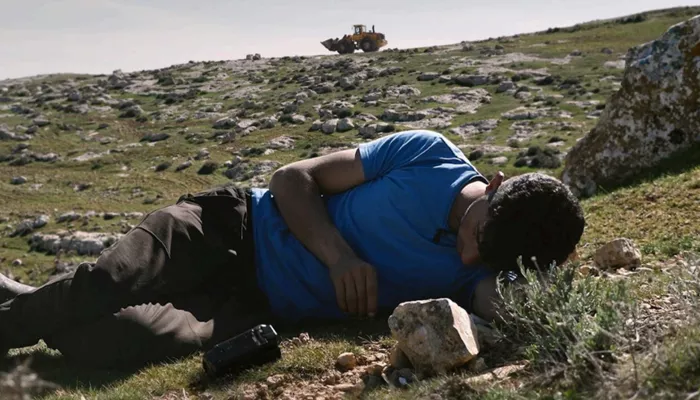The documentary No Other Land, which chronicles the devastating impact of Israeli military actions on the beleaguered community of Masafer Yatta in the occupied West Bank, has emerged as one of the most critically acclaimed films of the year. Directed by Palestinian filmmakers Basel Adra and Hamdan Ballal, alongside Israeli directors Yuval Abraham and Rachel Szor, the film has garnered widespread praise and recognition on the festival circuit. It received the Best Documentary Award at the Berlin International Film Festival in February, and has since claimed similar accolades at the Gotham Awards and from critics’ groups in New York and Los Angeles. Recently, the film also earned an Oscar nomination.
Despite its critical success, No Other Land has faced a significant challenge in securing U.S. distribution. While the film has captivated global audiences, no American studio has yet agreed to pick it up, despite the increasing demand, particularly after its Oscar nomination. Abraham attributes the lack of interest to political reasons, speculating that distributors are wary of the film’s sensitive subject matter.
“I still think it’s possible, but we’ll have to see,” Abraham said in a recent interview. “It’s clear that there are political reasons at play here. I’m hoping that the demand for the film will eventually lead to a distributor with the courage to take it on and show it to the audience.”
In response to the lack of distribution, the filmmakers have pursued a self-distribution model, ensuring that the film is shown in 23 theaters across the U.S., with plans for further expansion.
Adra, who was raised in Masafer Yatta and has been documenting the forced evictions since he was a teenager, is one of the film’s central subjects. Over the years, he has formed a close bond with Abraham, who, although based in Jerusalem, frequently travels to the West Bank to write about the situation for Israeli audiences.
In an interview last week, Adra shared the grim reality of life in the region, describing how his village had once again come under attack by armed settlers in the weeks leading up to the Oscar nominations.
“Even with the success of No Other Land, things have continued to get worse,” Adra said. “I want to say something personal because this is happening right here, right now. Our situation is deteriorating.”
The filmmakers hope that the success of the film will raise global awareness about the ongoing struggles in Masafer Yatta, where Israeli forces have been demolishing homes and expelling families in the name of expanding military training grounds. The documentary captures the human toll of these actions and the personal sacrifices made by the residents who have lived on this land for generations.
Despite the ongoing hardships, Adra remains steadfast in his belief that change is possible. “This injustice can’t last forever,” he said. “Whatever power is against us, it can’t last. We have to keep fighting.”
Abraham shares similar sentiments, acknowledging the discouragement that often accompanies the ongoing violence and displacement, but maintaining that the importance of documenting these events remains critical. “It’s not just about the film; it’s about making sure that this history is recorded,” he said. “It could be much worse without this documentation.”
The two filmmakers’ collaboration was born out of a shared commitment to social justice, despite the stark differences in their lived experiences. Adra, living under military law in the West Bank, faces significant travel restrictions, while Abraham, living under civilian law in Israel, is able to travel freely. This structural inequality has affected not only the making of the film but also their personal lives and careers.
The filmmakers also spoke about the dangers they faced while documenting the situation. Adra detailed several harrowing moments, including being beaten by soldiers while filming a house demolition, and escaping from a group of settlers intent on attacking him. “I was faster than them,” he remarked, reflecting the constant danger he faces.
Despite the challenges, the filmmakers remain committed to their work, driven by a sense of urgency heightened by the recent escalation of violence, including the 2023 Hamas attack on Israel. Abraham believes that the film’s message is more critical now than ever, with international politics and military actions exacerbating the already dire situation on the ground.
“We’ve been working for years, and we’ve been telling the world this situation is unsustainable,” Abraham said. “The world needs to understand the urgency of this issue.”
The decision to self-distribute the film in the U.S. came after repeated rejections by distributors, despite the film’s growing acclaim. While the filmmakers continue to hope that a distributor will eventually take on the film, they have taken matters into their own hands to ensure that it reaches American audiences.
“We were always optimistic that a distributor would pick it up,” said Abraham. “But after Berlin, after the awards, and after the Oscar nomination, nothing happened. So we decided to release it ourselves.”
The filmmakers were shocked when they learned of their Oscar nomination. “We never imagined it would happen,” Adra said. “It was a moment of happiness, but the reality on the ground is still getting worse.”
Looking ahead, the filmmakers continue to document the ongoing crisis. Though Adra is unsure whether he will make another documentary on the subject, he remains committed to capturing the daily struggles and violations faced by the people of Masafer Yatta.
As he embarks on fatherhood, Adra hopes for a better future for his daughter, born just a month ago, and the next generation. “I hope that things will change and they won’t have to fight for justice like we have,” he said. “But if the situation doesn’t improve, I’ll keep fighting.”
Related topic:
“The Tasters” Scores Major Sales at European Film Market
‘Ne Zha 2’ Surpasses The Super Mario Bros. Movie in Box Office Earnings
“Clown in a Cornfield” Slasher Movie Set for 2025 Release

